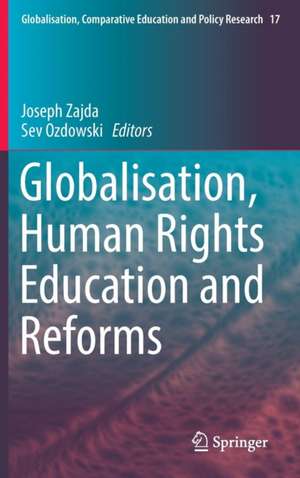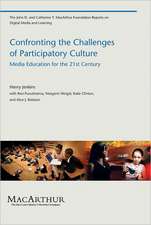Globalisation, Human Rights Education and Reforms: Globalisation, Comparative Education and Policy Research, cartea 17
Editat de Joseph Zajda, Sev Ozdowskien Limba Engleză Hardback – 4 oct 2016
| Toate formatele și edițiile | Preț | Express |
|---|---|---|
| Paperback (1) | 640.37 lei 43-57 zile | |
| SPRINGER NETHERLANDS – 15 iun 2018 | 640.37 lei 43-57 zile | |
| Hardback (1) | 646.62 lei 43-57 zile | |
| SPRINGER NETHERLANDS – 4 oct 2016 | 646.62 lei 43-57 zile |
Din seria Globalisation, Comparative Education and Policy Research
- 24%
 Preț: 731.71 lei
Preț: 731.71 lei - 20%
 Preț: 753.41 lei
Preț: 753.41 lei - 18%
 Preț: 727.66 lei
Preț: 727.66 lei - 15%
 Preț: 643.84 lei
Preț: 643.84 lei - 15%
 Preț: 636.63 lei
Preț: 636.63 lei - 15%
 Preț: 636.80 lei
Preț: 636.80 lei - 15%
 Preț: 637.28 lei
Preț: 637.28 lei - 15%
 Preț: 642.83 lei
Preț: 642.83 lei -
 Preț: 389.11 lei
Preț: 389.11 lei - 15%
 Preț: 643.00 lei
Preț: 643.00 lei - 15%
 Preț: 583.45 lei
Preț: 583.45 lei - 24%
 Preț: 694.97 lei
Preț: 694.97 lei - 18%
 Preț: 731.59 lei
Preț: 731.59 lei - 15%
 Preț: 644.82 lei
Preț: 644.82 lei - 18%
 Preț: 939.77 lei
Preț: 939.77 lei - 15%
 Preț: 635.31 lei
Preț: 635.31 lei - 18%
 Preț: 941.82 lei
Preț: 941.82 lei - 18%
 Preț: 994.39 lei
Preț: 994.39 lei - 18%
 Preț: 724.80 lei
Preț: 724.80 lei - 18%
 Preț: 886.43 lei
Preț: 886.43 lei - 18%
 Preț: 887.86 lei
Preț: 887.86 lei - 18%
 Preț: 777.35 lei
Preț: 777.35 lei - 15%
 Preț: 642.51 lei
Preț: 642.51 lei - 18%
 Preț: 781.45 lei
Preț: 781.45 lei - 18%
 Preț: 775.65 lei
Preț: 775.65 lei - 18%
 Preț: 938.66 lei
Preț: 938.66 lei
Preț: 646.62 lei
Preț vechi: 760.73 lei
-15% Nou
Puncte Express: 970
Preț estimativ în valută:
123.73€ • 129.53$ • 102.38£
123.73€ • 129.53$ • 102.38£
Carte tipărită la comandă
Livrare economică 07-21 aprilie
Preluare comenzi: 021 569.72.76
Specificații
ISBN-13: 9789402408706
ISBN-10: 9402408703
Pagini: 274
Ilustrații: XX, 275 p. 1 illus.
Dimensiuni: 155 x 235 x 18 mm
Greutate: 0.59 kg
Ediția:1st ed. 2017
Editura: SPRINGER NETHERLANDS
Colecția Springer
Seria Globalisation, Comparative Education and Policy Research
Locul publicării:Dordrecht, Netherlands
ISBN-10: 9402408703
Pagini: 274
Ilustrații: XX, 275 p. 1 illus.
Dimensiuni: 155 x 235 x 18 mm
Greutate: 0.59 kg
Ediția:1st ed. 2017
Editura: SPRINGER NETHERLANDS
Colecția Springer
Seria Globalisation, Comparative Education and Policy Research
Locul publicării:Dordrecht, Netherlands
Cuprins
Foreword.- Preface.- Contributors.- 1 Globalisation and Human Rights Education: Emerging Issues.- Part I Research Trends in Globalisation and Human Rights Education.- 2 Universal Human Rights Education in the Post-2015 Development Agenda.- 3 From Human Rights to Global Citizenship Education: Movement, Migration, Conflict and Capitalism in the Classroom.- 4 Changing the Culture of Child Rights in the USA.- 5 Globalization, Decentralization and Local Governments International Networking on Human Rights.- 6 Curriculum Reform in Transitional Justice Environments: The South African Human Rights Commission, Humang Rights Education and the Schooling Sector.- 7 The Role of Human Rights Education in Social Movements: Case Studies in South Africa and the United States.- 8 Human Rights Education in the Context of Global Education.- Part II Globalisation and Human Rights Education: Policy and Pedagogy.- 9 The Importance of including Human Rights Education in Primary and Secondary Schools: A Focuson Empathy and Respect.- 10 Human Rights Education with Children in Global South.- 11 Building Bridges to Religions by Justifying Human Rights.- 12 Racism, Equality and Civil Liberties in a Multicultural Australia.- 13 Human Rights Education: Refugees and Asylum Seekers' Right to Education in Israel.- 14 Human Rights Education and Intercultural Education.- 15 Human Rights Education in History Textbooks.- 16 Globalisation and Research in Human Rights Education.
Notă biografică
Textul de pe ultima copertă
This book, the seventeenth instalment in the 24-volume series Globalisation, Comparative Education and Policy Research, explores the interrelationship between ideology, the state and human rights education reforms, setting it in a global context. The book examines major human rights education reforms and policy issues in a global culture. It focuses on the ambivalent and problematic relationship between the state, globalisation and human rights education discourses. Using a number of diverse paradigms, ranging from critical theory to historical-comparative research, the authors examine the reasons for, and the outcomes of human rights education reforms and policy. The authors discuss discourses surrounding the major dimensions affecting the human rights education, namely national identity, democracy, and ideology. These dimensions are among the most critical and significant dimensions defining and contextualising the processes surrounding the nation-building, identitypolitics and human rights education globally. With this as its focus, the chapters represent hand-picked scholarly research on major discourses in the field of human rights education reforms. The book draws upon recent studies in the areas of globalisation, equality, and the role of the state in human rights education reforms. Furthermore, the perception of globalisation as dynamic and multi-faceted processes clearly necessitates a multiple-perspective approach in the study of human rights education. This book provides that perspective commendably. It also critiques current human rights education practices and policy reforms. It illustrates the way shifts in the relationship between the state and human rights education policy. In the book, the authors, who come from diverse backgrounds and regions, attempt insightfully to provide a worldview of current developments in research concerning human rights education, and citizenship education globally. The book contributes, in a very scholarly way, to a more holistic understanding of the nexus between nation-state, human rights education both locally and globally.
Caracteristici
Demonstrates the ideological imperatives of globalisation impacting human rights education reforms Evaluates the problematic relationship between globalisation, the state, and human rights education Offers a valuable sourcebook of ideas for human rights educators, practitioners and policy-makers Provides a timely overview of recent changes in human rights education and policy research globally Includes supplementary material: sn.pub/extras

















